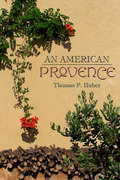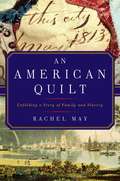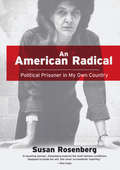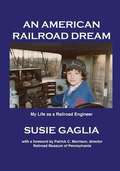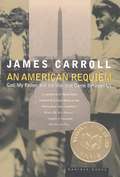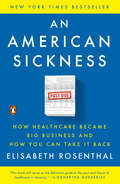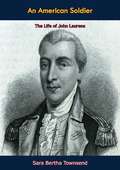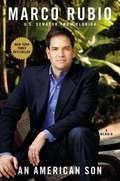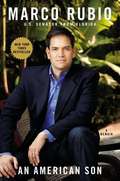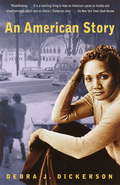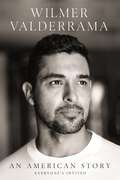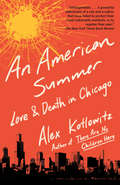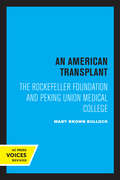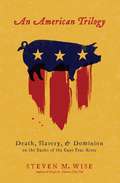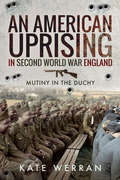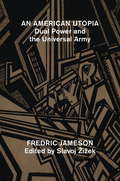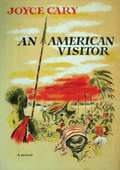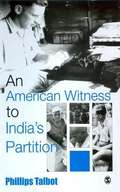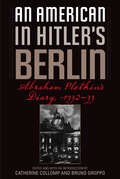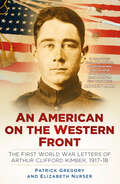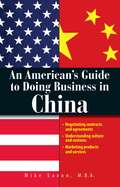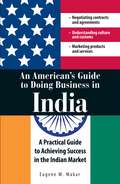- Table View
- List View
An American Provence
by Thomas P. Huber"I have talked about luscious wines and succulent fruit and exquisite dinners. But there may be no more evocative experience of the two valleys than the smell of new-mown hay in the fields at dusk. If a person were to close their eyes, they could not tell if they were in Provence or the North Fork Valley. That sweet, earthy odor is part of the beauty of these places." -From An American Provence In this poetic personal narrative, Thomas P. Huber reflects on two seemingly unrelated places-the North Fork Valley in western Colorado and the Coulon River Valley in Provence, France-and finds a shared landscape and sense of place. What began as a simple comparison of two like places in distant locations turned into a more complex, interesting, and personal task. Much is similar-the light, the valleys, the climate, the agriculture. And much is less so-the history, the geology, the physical makeup of villages. Using a geographer's eye and passion for the land and people, Huber examines the regions' similarities and differences to explore the common emotional impact of each region. Part intimate travelogue and part case study of geography in the real world, An American Provence illuminates the importance sense of place plays in who we are.
An American Quilt: Unfolding A Story Of Family And Slavery
by Rachel MayFollowing the trail left by an unfinished quilt, this illuminating saga examines slavery from the cotton fields of the South to the textile mills of New England—and the humanity behind it. When we think of slavery, most of us think of the American South. We think of back-breaking fieldwork on plantations. We don’t think of slavery in the North, nor do we think of the grueling labor of urban and domestic slaves. Rachel May’s rich new book explores the far reach of slavery, from New England to the Caribbean, the role it played in the growth of mercantile America, and the bonds between the agrarian south and the industrial north in the antebellum era—all through the discovery of a remarkable quilt. While studying objects in a textile collection, May opened a veritable treasure-trove: a carefully folded, unfinished quilt made of 1830s-era fabrics, its backing containing fragile, aged papers with the dates 1798, 1808, and 1813, the words “shuger,” “rum,” “casks,” and “West Indies,” repeated over and over, along with “friendship,” “kindness,” “government,” and “incident.” The quilt top sent her on a journey to piece together the story of Minerva, Eliza, Jane, and Juba—the enslaved women behind the quilt—and their owner, Susan Crouch. May brilliantly stitches together the often-silenced legacy of slavery by revealing the lives of these urban enslaved women and their world. Beautifully written and richly imagined, An American Quilt is a luminous historical examination and an appreciation of a craft that provides such a tactile connection to the past.
An American Radical: Political Prisoner in My Own Country
by Susan RosenbergOn a November night in 1984, Susan Rosenberg sat in the passenger seat of a U-Haul as it swerved along the New Jersey Turnpike. At the wheel was a fellow political activist. In the back were 740 pounds of dynamite and assorted guns. That night I still believed with all my heart that what Che Guevara had said about revolutionaries being motivated by love was true. I also believed that our government ruled the world by force and that it was necessary to oppose it with force. Raised on New York City's Upper West Side, Rosenberg had been politically active since high school, involved in the black liberation movement and protesting repressive U. S. policies around the world and here at home. At twenty-nine, she was on the FBI's Most Wanted list. While unloading the U-Haul at a storage facility, Rosenberg was arrested and sentenced to an unprecedented 58 years for possession of weapons and explosives. I could not see the long distance I had traveled from my commitment to justice and equality to stockpiling guns and dynamite. Seeing that would take years. Rosenberg served sixteen years in some of the worst maximum-security prisons in the United States before being pardoned by President Clinton as he left office in 2001. Now, in a story that is both a powerful memoir and a profound indictment of the U. S. prison system, Rosenberg recounts her journey from the impassioned idealism of the 1960s to life as a political prisoner in her own country, subjected to dehumanizing treatment, yet touched by moments of grace and solidarity. Candid and eloquent, An American Radical reveals the woman behind the controversy--and reflects America's turbulent coming-of-age over the past half century. Since her release from prison in 2001, Susan Rosenberg has been a speaker, educator, and lecturer to young people, graduate students, and those concerned with the issues of women in prison, political prisoners, prison reform and social justice activism. She has lectured on these topics at Stanford Law School, Yale University Law School, Columbia University School of Human Rights, Rutgers University, Brown University Department of African American Studies, New York University Department of Women's and Legal Studies, University of Massachusetts Department of Legal Studies, University of Michigan, Georgia State University Law School, CUNY Graduate Center, and Washington University School of Law. In addition, she has participated in prison reform, women's studies and legal conferences around the country. Since 2004, Rosenberg has served as the director of communications at a faith-based human rights organization working to alleviate poverty, hunger and disease in the developing world. Rosenberg received an M. A. in Writing from Antioch University while in prison, as well as taking graduate courses in creative and expository writing from the University of Iowa. She is an award-winning member of PEN (Poets, Essayists and Novelists) and a member of the PEN Prison Writing Committee. For the last three years she has been on panels at the PEN World Voices Festival with globally recognized authors. She lives in New York City with her family.
An American Railroad Dream: My Career As A Locomotive Engineer
by Susie Gaglia Patrick MorrisonSusie Gaglia reminisces about fulfilling her childhood dream with her career as railroad engineer for passenger and freight trains along the Northeast Corridor during the mid twentieth century. Beginning with her upbringing in a suburb of Buffalo through the process of qualifying to operate locomotives to vignettes from her fifteen-year career, Susie remembers kind mentors, close encounters on the tracks, near misses, massive accidents, and moments of sexual harassment as she fulfilled an American railroad dream.
An American Requiem: God, My Father, and the War that Came Between Us
by James CarrollNational Book Award winner: This story of a family torn apart by the Vietnam era is &“a magnificent portrayal of two noble men who broke each other&’s hearts&” (Booklist). James Carroll grew up in a Catholic family that seemed blessed. His father, who had once dreamed of becoming a priest, instead began a career in J. Edgar Hoover&’s FBI, rising through the ranks and eventually becoming one of the most powerful men in the Pentagon, the founder of the Defense Intelligence Agency. Young Jim lived a privileged life, dating the daughter of a vice president and meeting the pope—all in the shadow of nuclear war, waiting for the red telephone to ring in his parents&’ house. James fulfilled the goal his father had abandoned, becoming a priest himself. His feelings toward his father leaned toward worship as well—until the tumult of the 1960s came between them. Their disagreements, over Martin Luther King, Jr. and the civil rights movement; turmoil in the Church; and finally, Vietnam—where the elder Carroll chose targets for US bombs—began to outweigh the bond between them. While one of James&’s brothers fled to Canada, another was in law enforcement ferreting out draft dodgers. James, meanwhile, served as a chaplain at Boston University, protesting the war in the streets but ducking news cameras to avoid discovery. Their relationship would never be the same again. Only after Carroll left the priesthood to become a writer, and a husband with children of his own, did he begin to understand fully the struggles his father had faced. In An American Requiem, the New York Times bestselling author of Constantine&’s Sword and Christ Actually offers a benediction, in &“a moving memoir of the effect of the Vietnam War on his family that is at once personal and the story of a generation . . . at once heartbreaking and heroic, this is autobiography at its best&” (Publishers Weekly).
An American Sickness: How Healthcare Became Big Business and How You Can Take It Back
by Elisabeth Rosenthal<P>At a moment of drastic political upheaval, a shocking investigation into the dangerous, expensive, and dysfunctional American healthcare system, as well as solutions to its myriad of problems In these troubled times, perhaps no institution has unraveled more quickly and more completely than American medicine. <P>In only a few decades, the medical system has been overrun by organizations seeking to exploit for profit the trust that vulnerable and sick Americans place in their healthcare. Our politicians have proven themselves either unwilling or incapable of reining in the increasingly outrageous costs faced by patients, and market-based solutions only seem to funnel larger and larger sums of our money into the hands of corporations. Impossibly high insurance premiums and inexplicably large bills have become facts of life; fatalism has set in. Very quickly Americans have been made to accept paying more for less. How did things get so bad so fast? <P> Breaking down this monolithic business into the individual industries—the hospitals, doctors, insurance companies, and drug manufacturers—that together constitute our healthcare system, Rosenthal exposes the recent evolution of American medicine as never before. How did healthcare, the caring endeavor, become healthcare, the highly profitable industry? <P>Hospital systems, which are managed by business executives, behave like predatory lenders, hounding patients and seizing their homes. Research charities are in bed with big pharmaceutical companies, which surreptitiously profit from the donations made by working people. Patients receive bills in code, from entrepreneurial doctors they never even saw. The system is in tatters, but we can fight back. Dr. Elisabeth Rosenthal doesn't just explain the symptoms, she diagnoses and treats the disease itself. <P>In clear and practical terms, she spells out exactly how to decode medical doublespeak, avoid the pitfalls of the pharmaceuticals racket, and get the care you and your family deserve. She takes you inside the doctor-patient relationship and to hospital C-suites, explaining step-by-step the workings of a system badly lacking transparency. <P>This is about what we can do, as individual patients, both to navigate the maze that is American healthcare and also to demand far-reaching reform. An American Sickness is the frontline defense against a healthcare system that no longer has our well-being at heart. <P><b>A New York Times Bestseller</b>
An American Soldier: The Life of John Laurens
by Henry Laurens Sara Bertha Townsend John LaurensOriginally published in 1958, this is the biography of John Laurens (1754-1782), an American soldier and statesman from South Carolina during the American Revolutionary War, best known for his criticism of slavery and his efforts to help recruit slaves to fight for their freedom as U.S. soldiers.In the author’s own words, Laurens hailed from an era that “knew nothing of flamethrowers and submarines, of atomic bombs and guided missiles. To the young republic this man gave his utmost devotion, acting within five momentous years the roles of soldier, legislator, aide-de-camp to the Commander-in-Chief, and Special Minister to France.”
An American Son: A Memoir
by Marco RubioFew politicians have risen to national prominence as quickly as Marco Rubio. At age forty-one he's the subject of widespread interest and speculation. But he has never before told the full story of his unlikely journey, with all the twists and turns that made him an American son. That journey began when his parents first left Cuba in 1956. After Fidel Castro solidified his Communist grip on power, Mario and Oria Rubio could never again return to their homeland. But they embraced their new country and taught their children to appreciate its unique opportunities. Every sacrifice they made over the years, as they worked hard at blue-collar jobs in Miami and Las Vegas, was for their children. As a boy, Rubio spent countless hours with his grandfather, discussing history and current events. "Papa" loved being Cuban, but he also loved America for being a beacon of liberty to oppressed people around the world. As Rubio puts it, "My grandfather didn't know America was exceptional because he read about it in a book. He lived it and saw it with his own eyes. Devastated after his grandfather's death, Rubio was getting poor grades and struggled to fit in at his high school, where some classmates mocked him as "too American. " But then he buckled down for college and law school, driven by his twin passions for football and politics. He played football at a small college in Missouri, then came back to Florida to attend Santa Fe Community College and the University of Florida. He went on to earn his law degree from the University of Miami and took a job at a law firm, which paid him a handsome salary that allowed his father to retire. As a young attorney he ran for the West Miami City Commission, a role that led to the Florida House of Representatives. In just six years he rose to Speaker of the House and became a leading advocate for free enterprise, better schools, limited government, and a fairer, simpler tax system. He found that he could connect with people across party lines while still upholding conservative values. His U. S. Senate campaign started as an extreme long shot against Florida's popular incumbent governor, Charlie Crist. Undaunted by the early poll numbers and the time away from his wife and kids, Rubio traveled the state with his message of empowerment and optimism. He upset Crist in both the primary and a dramatic three-way general election, after Crist quit the GOP to run as an independent. Now Rubio speaks on the national stage about the challenges we face and the better future that's possible if we return to our founding principles. As he puts it, Conservatism is not about leaving people behind. Conservatism is about allowing people to catch up. In that vision, as in his family's story, Rubio proves that the American Dream is still alive for those who pursue it.
An American Son: A Memoir
by Marco RubioFew politicians have risen to national prominence as quickly as Marco Rubio. At age forty-one he's the subject of widespread interest and speculation. But he has never before told the full story of his unlikely journey, with all the twists and turns that made him an American son. That journey began when his parents first left Cuba in 1956. After Fidel Castro solidified his Communist grip on power, Mario and Oria Rubio could never again return to their homeland. But they embraced their new country and taught their children to appreciate its unique opportunities. Every sacrifice they made over the years, as they worked hard at blue-collar jobs in Miami and Las Vegas, was for their children. As a boy, Rubio spent countless hours with his grandfather, discussing history and current events. "Papa" loved being Cuban, but he also loved America for being a beacon of liberty to oppressed people around the world. As Rubio puts it, "My grandfather didn't know America was exceptional because he read about it in a book. He lived it and saw it with his own eyes. " Devastated after his grandfather's death, Rubio was getting poor grades and struggled to fit in at his high school, where some classmates mocked him as "too American. " But then he buckled down for college and law school, driven by his twin passions for football and politics. He played football at a small college in Missouri, then came back to Florida to attend Santa Fe Community College and the University of Florida. He went on to earn his law degree from the University of Miami and took a job at a law firm, which paid him a handsome salary that allowed his father to retire. As a young attorney he ran for the West Miami City Commission, a role that led to the Florida House of Representatives. In just six years he rose to Speaker of the House and became a leading advocate for free enterprise, better schools, limited government, and a fairer, simpler tax system. He found that he could connect with people across party lines while still upholding conservative values. His U. S. Senate campaign started as an extreme long shot against Florida's popular incumbent governor, Charlie Crist. Undaunted by the early poll numbers and the time away from his wife and kids, Rubio traveled the state with his message of empowerment and optimism. He upset Crist in both the primary and a dramatic three-way general election, after Crist quit the GOP to run as an independent. Now Rubio speaks on the national stage about the challenges we face and the better future that's possible if we return to our founding principles. As he puts it, "Conservatism is not about leaving people behind. Conservatism is about allowing people to catch up. " In that vision, as in his family's story, Rubio proves that the American Dream is still alive for those who pursue it.
An American Story
by Debra J. DickersonA profoundly courageous and insightful memoir, An American Story documents the events that have shaped journalist Debra Dickerson's conscience.The daughter of former sharecroppers, Dickerson never imagined she would emerge from her squalid St. Louis neighborhood to become an acclaimed journalist with a Harvard Law degree. A constant reader and a straight-A student, nevertheless Dickerson's lack of confidence kept her from accepting the many colleges offers she received. Instead she enlisted in the U.S. Air Force, quickly rising through the ranks. In spite of her success, she recognized within herself deep-seated conflict at being a working class black woman living in a white man's world. Her path to self-acceptance is at the heart of this refreshing narrative.From the Trade Paperback edition.
An American Story: Everyone’s Invited
by Wilmer ValderramaThe remarkable true story of a young immigrant from Venezuela who had a dream to change the world, a talent for entertaining, and a determined spirit to build a new life, taking as many as possible with him on the journey.An American Story is the stirring memoir by actor, producer, and activist Wilmer Valderrama, delving into his upbringing in Venezuela where he was raised by two hard working parents as they navigated their family through a rapidly changing country and the rise of Hugo Chavez. With the economy crashing around them and their livelihood disappearing, the family decides to flee the country. Suddenly, the young boy who had loved riding his horse and dreaming of being Zorro from his favorite black and white tv show had to grow up quickly, journeying as a teenager from a tiny little pueblo in Venezuela to the big city of Los Angeles.After being cast in a school theatre production, Valderrama knew he had found his calling, and began thinking of ways to help support his struggling family. He would attempt the impossible: find work in Hollywood as an unproven Latino actor. Following countless auditions and frequent criticisms of his accent, he created the personality that would eventually land him the role as Fez on the hit series That 70s Show, which catapulted him to stardom.Over the coming years, he would create the smash show, Yo Mamma, voice the lead character in Disney&’s Encanto, and so much more, culminating in his joining the cast of the hit show NCIS in 2016.It was through service to others and his first USO trip, however, where Valderrama found his expanded calling, entertaining and encouraging U.S. troops around the world. He has since traveled with the USO a multitude of times, having participated in almost 50 tours domestically and internationally and was recently named USO Global Ambassador.Through his work, Valderrama hopes to demonstrate his love and gratitude for the country that changed his life. An American Story weaves Valderrama&’s personal stories with those of the remarkable people he&’s met along his philanthropic journey. This isn&’t just Valderrama&’s story, though. It&’s a view of America through an immigrant&’s eyes, in both its stunning unmatched wonders and all its native challenges. It is the profound and gripping story of someone who found the way and is now inviting as many as possible to join him on the adventure.
An American Summer: Love and Death in Chicago
by Alex KotlowitzFrom the bestselling author of There Are No Children Here, a richly textured, heartrending portrait of love and death in Chicago's most turbulent neighborhoods. <P><P>The numbers are staggering: over the past twenty years in Chicago, 14,033 people have been killed and another roughly 60,000 wounded by gunfire. What does that do to the spirit of individuals and community? <P><P>Drawing on his decades of experience, Alex Kotlowitz set out to chronicle one summer in the city, writing about individuals who have emerged from the violence and whose stories capture the capacity--and the breaking point--of the human heart and soul. <P><P>The result is a spellbinding collection of deeply intimate profiles that upend what we think we know about gun violence in America. <P><P>Among others, we meet a man who as a teenager killed a rival gang member and twenty years later is still trying to come to terms with what he's done; a devoted school social worker struggling with her favorite student, who refuses to give evidence in the shooting death of his best friend; the witness to a wrongful police shooting who can't shake what he has seen; and an aging former gang leader who builds a place of refuge for himself and his friends. <P><P> Applying the close-up, empathic reporting that made There Are No Children Here a modern classic, Kotlowitz offers a piercingly honest portrait of a city in turmoil. These sketches of those left standing will get into your bones. This one summer will stay with you.
An American Transplant: The Rockefeller Foundation and Peking Union Medical College
by Mary B. BullockThis title is part of UC Press's Voices Revived program, which commemorates University of California Press’s mission to seek out and cultivate the brightest minds and give them voice, reach, and impact. Drawing on a backlist dating to 1893, Voices Revived makes high-quality, peer-reviewed scholarship accessible once again using print-on-demand technology. This title was originally published in 1980.
An American Trilogy
by Steven M. WiseThe Cape Fear River runs through Bladen County, North Carolina, population 33,000. On its western bank, in the town of Tar Heel, sits the largest slaughterhouse in the world. Deep below the slaughterhouse, one may find the arrowheads of Siouan-speaking peoples who roamed there for a millennium. Nearer the surface is evidence of slaves who labored there for a century. And now, the slaughterhouse kills the population of Bladen County, in hogs, every day.In this remarkable account, Wise traces the history of today's deadly harvest. From the colonies to the slave trade, from the artificial conception and unrecorded death of one single pig to the surreal science of the pork industry-whose workers continue the centuries of oppression-he unveils a portrait of this nation through the lives of its most vulnerable. His explorations ultimately lead to hope from a most unlikely source: the Baptist clergy, a voice in this wilderness proclaiming a new view of creation.
An American Uprising in Second World War England: Mutiny in the Duchy
by Kate WerranThe shocking story of a WWII shootout between black and white GIs in a quiet Cornish town that put the British-US “special relationship” on trial.On September 26, 1943, racial tensions between American soldiers stationed in Cornwall erupted in gunfire. Labelled a ‘wild west’ mutiny by the tabloids, it became front page news in Great Britain and the USA. For Americans, it bolstered a fast-accelerating civil rights movement, while in the UK, it exposed unsettling truths about Anglo-American relations. With new archival research, journalist Kate Werran pieces together the shocking drama that authorities tried to hush up. Her narrative examines everything from the controversy of American segregation on British soil to the shocking event itself and the resulting court martial.Extracted from wartime cabinet documents, secret government surveys, opinion polls, diaries, letters and newspapers as well as testimony from those who remember it, this story offers a rare window into a little-known dark side of the ‘American Invasion.’
An American Utopia: Dual Power and the Universal Army
by Slavoj Zizek Fredric JamesonControversial manifesto by acclaimed cultural theorist debated by leading writers Fredric Jameson's pathbreaking essay "An American Utopia" radically questions standard leftist notions of what constitutes an emancipated society. Advocated here are--among other things--universal conscription, the full acknowledgment of envy and resentment as a fundamental challenge to any communist society, and the acceptance that the division between work and leisure cannot be overcome. To create a new world, we must first change the way we envision the world. Jameson's text is ideally placed to trigger a debate on the alternatives to global capitalism. In addition to Jameson's essay, the volume includes responses from philosophers and political and cultural analysts, as well as an epilogue from Jameson himself. Many will be appalled at what they will encounter in these pages--there will be blood! But perhaps one has to spill such (ideological) blood to give the Left a chance. Contributing are Kim Stanley Robinson, Jodi Dean, Saroj Giri, Agon Hamza, Kojin Karatani, Frank Ruda, Alberto Toscano, Kathi Weeks, and Slavoj i ek.From the Trade Paperback edition.
An American Verdict
by Michael J. ArlenA collection of law cases. In Cook County courthouse, in Room 702, which is Judge Philip Romiti's courtroom, the court is in session.
An American Visitor
by Joyce CaryAn American visitor and uninvited guest in the village of Nok, Marie Hasluck is an irrepressible anthropologist who believes that she has found the Kingdom of Heaven in the forests of Nigeria. There, to her eyes, the Birri tribesmen make love and war unfettered by the constraints and complications of Western civilisation; a state which Marie finds enviable and which she does her best to emulate.However, all is not well even in this pagan paradise: white prospectors are staking claims within Birri territory and the eccentric District Officer, Bewser, can no longer keep them at bay, for all his promises to the villagers. As the Birri warriors become increasingly enraged by the colonialists' betrayal and as her own involvement with Bewser deepens, Marie finds that her position as a charmed but distanced onlooker is inevitably compromised.
An American Witness To India's Partition
by Phillip TalbotIn 1938 the New York-based Institute of Current World Affairs awarded 23-year-old Phillips Talbot a fellowship with a mandate: visit South Asia and learn about the intricacies of life in India. Till 1950, Talbot graphically recounted the buildup to Indian and Pakistani independence, and the early experiences of the new states in the form of several letters to the institute. Talbot`s reports from the field, presented here in the original, offer a kaleidoscope of first-hand observations: on student life at the Aligarh Muslim University, local life in a small Muslim community in Kashmir, a Vedic ashram in Lahore, Tagore`s Shantiniketan, Gandhi's Sevagram, crucial sessions of the Indian National Congress and the All India Muslim League, the Kodaikanal Ashram Fellowship, Hindu and Muslim urban communities in Lahore and Bombay, Afghanistan, a walk with Gandhi in Noakhali, the parties` negotiations with Mountbatten that led to independence and more. Written with flair and insight, An American Witness to India`s Partition, provides a perceptive view of South Asian society in its decisive decade.
An American in Hitler's Berlin: Abraham Plotkin's Diary, 1932-33
by Abraham PlotkinThis is the first published edition of the diary of Abraham Plotkin, an American labor leader of immigrant Jewish origin who lived in Berlin between November 1932 and May 1933. A firsthand account of the Weimar Republic's final months and the early rise of Nazi power in Germany, Plotkin's diary focuses on the German working class, the labor movement, and the plight of German Jews. Plotkin investigated Berlin's social conditions with the help of German Social-Democratic leaders whose analyses of the situation he records alongside his own. Compared to the writings of other American observers of the Third Reich, Plotkin's diary is unique in style, scope, themes, and time span. Most accounts of Hitler's rise to power emphasize political institutions by focusing on the Nazi party's clashes with other political forces. In contrast, Plotkin is especially attentive to socioeconomic factors, providing an alternative view from the left that stems from his access to key German labor and socialist leaders. Chronologically, the diary reports on the moment when Hitler's seizure of power was not yet inevitable and when leaders on the left still believed in a different outcome of the crisis, but it also includes Plotkin's account of the complete destruction of German labor in May 1933.
An American on the Western Front: The First World War Letters of Arthur Clifford Kimber, 1917-18
by Patrick Gregory Elizabeth NurserThis is the remarkable story of the American First World War serviceman Arthur Clifford Kimber. When his country entered the Great War in 1917, Kimber left Stanford University to carry the first official American flag to the Western Front. Fired by idealism for the French cause, the young student initially acted as a volunteer ambulance driver, before training as a pilot and taking part in dogfights against ‘the Boche’. His letters home give a vivid picture of what Kimber witnessed on his journey from Palo Alto, California to the front in France: keen-eyed descriptions of New York as it prepared for the forthcoming conflict, the privations of wartime Britain and France, and encounters with former president Theodore Roosevelt and Hollywood actress Lillian Gish. Kimber details his exhilaration, his everyday concerns and his horror as he adapts to an active wartime role. Arthur Clifford Kimber was one of the first Americans on the front line after the entry of the US into the war and, tragically, also one of the last to be buried there – killed in action just a few weeks before the end of the war. Here, his frank letters to his mother and brothers, compiled, edited and put in context by Patrick Gregory and Elizabeth Nurser, are published for the first time.
An American's Guide To Doing Business In China
by Mike SaxonDid you know? Americans have bought $185 billion worth of Chinese goods China's economy is growing at an astounding rate of 9 percent a year The trade gap between the U.S. and China has been growing by more than 25 percent per year. Whether you work for a company doing business in China, or are an entrepreneur looking to export your goods and services An American's Guide to Doing Business in China teaches you the practicalities and the pitfalls of dealing with this complex market. While there are undeniable opportunities in the Chinese market there is also a great deal of hype-and very real political and cultural differences that make doing business in China extremely challenging. Written by an industry expert with more than two decades of experience, An American's Guide to Doing Business in China is an authoritative and accessible guide on all aspects of doing business in China. An American's Guide to Doing Business in China gives you the information most relevant to doing business in China on a day-to-day basis including: Finding manufacturing partners; Negotiating contracts and agreements; Choosing a location and hiring employees. This guide also teaches you how to navigate Chinese culture and customs, market and advertise to Chinese consumers, and find the hottest opportunities. An American's Guide to Doing Business in China is what you need to succeed in the world's biggest market.
An American's Guide To Doing Business In China: Negotiating Contracts And Agreements; Understanding Culture and Customs; Marketing Products and Services
by Mike SaxonA Simon & Schuster eBook. Simon & Schuster has a great book for every reader.
An American's Guide to Doing Business in China
by Mike SaxonWritten by an industry expert with more than two decades of experience, An American's Guide to Doing Business in China is an authoritative and accessible guide on all aspects of doing business in China.
An American's Guide to Doing Business in India
by Eugene M MakarDid you know that . . .U.S. money pours into India at a rate of over $25 million every day? India's economic growth has averaged 8.6 percent a year since 2004? At this rate, India will become the fifth largest consumer market by 2025 (up from #12 today)? U.S. venture firms will raise $1 billion for India by the end of 2007? U.S. exports to India have more than doubled over the last five years? China aside, India is the world's most rapidly growing economy. But cashing in on that opportunity can be as challenging as it is rewarding. Whether you work for a company doing business in India or are an entrepreneur looking to export your goods and services, An American's Guide to Doing Business in India will help you navigate all aspects of this complex market. Esteemed industry consultant Eugene M. Makar offers his proven tips, tools, and techniques to help you: Break into the market; Weigh the pros and cons of investments; Find joint venture partners; Hire local representation; and more.You'll also learn to recognize key social and cultural differences. From where to bank to what to wear, you'll discover what makes India different-and how you can best position yourself there for success.
